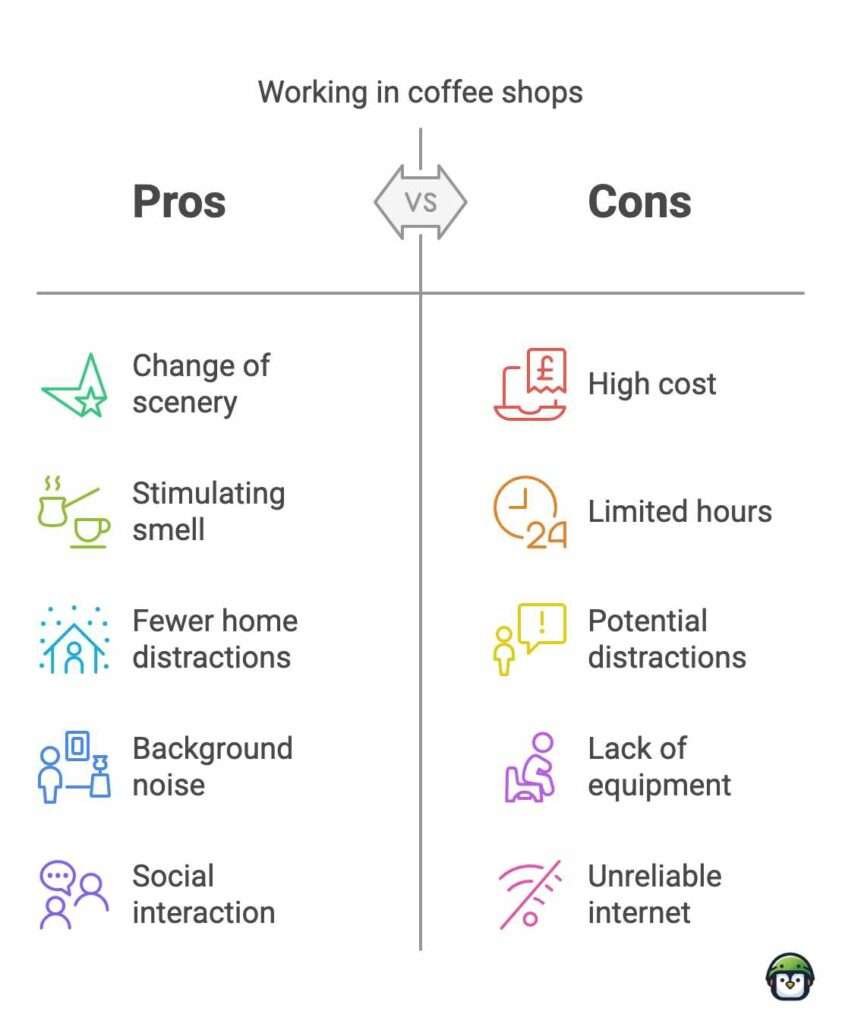A coffee shop is the secret weapon I never knew I needed for productivity.
As a solopreneur and software developer, I’ve spent years battling the productivity paradox. I tried every hack in the book—Pomodoro timers, time blocking, digital detoxes, even the dreaded “wake up at 5 AM” experiment.
But no matter how structured my approach, I’d always hit the same wall: home was full of distractions. The laundry pile would call my name. The fridge became my worst enabler. And somehow, scrolling through tech forums felt just productive enough to justify procrastination.
Then, I stumbled across a story about J.K. Rowling. While writing the final Harry Potter books, she didn’t rely on productivity hacks—she checked into a luxury hotel in Scotland just to escape distractions.
It made me wonder: maybe the problem wasn’t my routine, but my environment.
I didn’t need a medieval castle, but I did need a space that signaled “work mode.”
Enter the coffee shop: a place where the background hum of conversations, the smell of espresso, and the simple act of being out in public kept me accountable. Suddenly, I wasn’t overthinking productivity—I was just working.
The coffee shop provides the perfect balance of structure and flexibility. Unlike working from home, where personal tasks constantly intrude, a coffee shop separates work from leisure.
The ambient noise isn’t distracting—it’s motivating. There’s something about the low murmur of conversations, the rhythmic clinking of cups, and the occasional hiss of the espresso machine that makes focusing easier. Studies even suggest that moderate background noise, like what you’d hear in a coffee shop, can enhance creative thinking.
Beyond the atmosphere, a coffee shop also adds a subtle sense of accountability. At home, no one cares if I spend 30 minutes mindlessly scrolling social media. But in a coffee shop, surrounded by other people working on their own projects, there’s an unspoken pressure to stay on task.
It’s a productivity hack that doesn’t feel like a hack—it’s just a shift in environment that makes deep work feel natural.
For solopreneurs, freelancers, remote workers, and anyone struggling with productivity, a coffee shop might be the simplest solution. It’s not about the caffeine (though that helps). It’s about the separation of spaces, the change in routine, and the natural focus that comes from being in the right environment. If home office distractions are holding you back, pack your laptop, find a cozy coffee shop, and experience the productivity boost for yourself.
· · ─ ·𖥸· ─ · ·
Is a Coffee Shop the Best Workspace for You?
Working in a coffee shop has its perks—ambient noise, a fresh environment, and unlimited caffeine. But it’s not without downsides, like background chatter and unpredictable Wi-Fi. Before packing your laptop, let’s break down the pros and cons to see if a coffee shop is the right productivity spot for you.
Pros
- Change of Scenery: A different environment can stimulate creativity and reduce the monotony of working in the same place every day.
- The Smell: The ubiquitous smell of coffee somehow triggers my brain to go to work mode.
- Fewer Home Distractions: Away from the household chores, TV, and other home comforts, I can focus better on my tasks.
- Background Noise: The ambient noise in coffee shops can enhance concentration. Tools like the “coffee shop effect” or apps like Coffitivity can mimic this at home.
- Social Interaction: Even minimal social interaction can boost mood and motivation, providing a sense of being part of a community. I refer to them as “my classmates.” It is as if working in a regular office where you see people working but interact in a limited capacity.
- Set Time Limits: The limited time I spend at a coffee shop (due to opening hours or cost) creates a sense of urgency, making me more focused and productive.
- Routine and Structure: Having a routine of going to a coffee shop can create a psychological trigger for getting into “work mode.”
Cons
- Cost: Regularly buying coffee and snacks can add up, making it an expensive habit.
- Limited Time: Most coffee shops have limited hours, and staying all day might not be feasible.
- Potential Distractions: Noise levels can sometimes be unpredictable, with loud conversations or busy times disrupting concentration.
- Lack of Equipment: Coffee shops typically don’t provide ergonomic furniture or additional monitors, which can be a limitation for some tasks.
- Internet Reliability: Wi-Fi can be slow or unstable, affecting productivity for tasks requiring a solid internet connection.
· · ─ ·𖥸· ─ · ·
Why a Coffee Shop Works for Me—And Maybe for You Too
For me, working in a coffee shop is the perfect balance of structure and freedom. The gentle hum of conversation, the steady flow of coffee, and the subtle accountability of being surrounded by other focused people help me stay productive without feeling boxed in. It’s a space where I can show up, tune in, and get things done—without the distractions of home or the rigidity of an office.
Of course, it’s not without its downsides. Spotty Wi-Fi, noisy patrons, and the occasional hunt for an available outlet can be frustrating. But for the boost in creativity, focus, and motivation, it’s a trade-off I’m happy to make.
If you’re struggling to find your ideal workspace, why not give a coffee shop a shot? Grab your laptop, order your favorite brew, and see if it fuels your productivity like it does mine.
For me, working in a coffee shop aligns better with my productivity goals despite the higher cost and limited time. The change of environment, fewer home distractions, and structured work hours contribute to getting more done. Conversely, working at home, while comfortable and cost-effective, often leads to distractions and a lack of focus.
As a solopreneur and software developer, finding the right workspace is crucial, and coffee shops have proven to be the sweet spot for balancing productivity and work satisfaction.



Leave a Reply